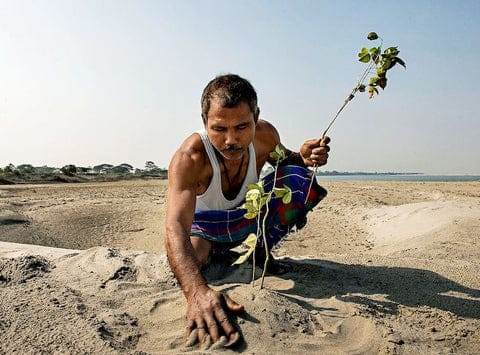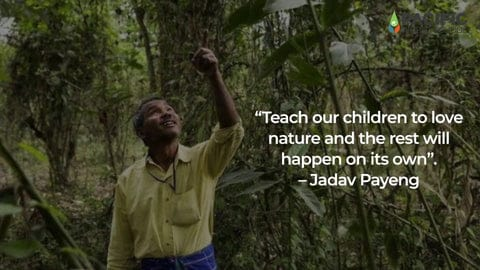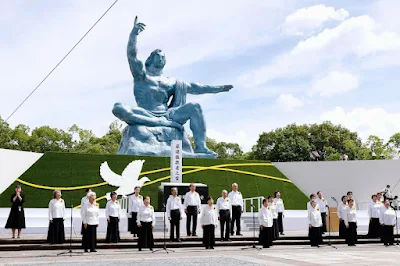Sunday 21 August 2022
The roll call of shame : The Tory MP's who voted to allow sewage to be discharged into our seas and rivers.
Friday 19 August 2022
Enough Is Enough !
Wednesday 17 August 2022
The Man Who Turned Desert Into Forest By Planting A Tree Everyday For 40 Years
Tuesday 16 August 2022
Marking the 203rd anniversary of the Peterloo Massacre
Stand ye calm and resolute,
Like a forest close and mute,
With folded arms and looks which are
Weapons of unvanquished war,
And that slaughter to the Nation
Shall steam up like inspiration,
Eloquent, oracular;
A volcano heard afar.
Rise like Lions after slumber
In unvanquishable number,
Shake your chains to earth like dew
Which in sleep had fallen on you-
Ye are many - they are few."
That closing verse is perhaps one of the best known pieces of poetry in
any movement of the oppressed all over the world such is it's
resonance.Encouraging people to rise up and challenge the tyranny that
they are facing every day of their lives, against the undeniable
injustices.faced by the many at the hands of the few. The rallying
language of the poem has led to elements of it being recited by
students at Tiananmen Square and by protestors in Tahir Square during
the revolution in Egypt in 2011.It would inspire the campaign slogan "We
are many, they are few" used by anti Poll Tax demonstrators in
1989-90, and also inspired the title of the 2014 documentary film We are Many, which
focussed on the worldwide anti-war protests of 2003, Labour leader
Jeremy Corbyn has also memorably used the final stanza.
Shelley’s friend and publisher, Leigh Hunt did not publish the poem
until after Shelley’s death fearing that the opinions in it were too
controversial and inflammatory. The Masque of Anarchy has been
described as “the greatest political poem ever written in English” by
people such as Richard Holmes. It inspired Henry David Thoreau’s Civil Disobedience which
in turn influenced the anarchist writings of Leo Tolstoy.Percy Bysshe
Shelley believed that “poets are the unacknowledged legislators of the
world.”He would remain a serious advocate for serious reform for the
rest of his life, and would come to serve as a prophetic voice and
inspiration to those, like the Chartists who created significant
movements for peaceful reform, alongside generations of activists to
this present day. Many
years later his powerful poem is as relevant in austerity gripped
Britain as when it was first written and reminds us that Poetry can
serve to inspire and motivate people and change and influence ideas. It
is one of the most powerful tools we have.
Full text of Shelley's Mask of Anarchy can be found here:-
http://knarf.english.upenn.edu/PShelley/anarchy.html
An earlier post on Shelley can be found here :-
https://teifidancer-teifidancer.blogspot.com/2017/08/percy-bysshe-shelley-august-4-1792-july.html
Print of the Peterloo Massacre published by Richard Carlisle
Friday 12 August 2022
Beyond the Weight of the World
Life can feel good until you are randomly hit by a wave of sadness, I feel sadness at the passing of people I didn't know but who made my life brighter. And sadness too for people I didn't know whose awful and undeserved deaths made me question what world we're living in. No human should be bombed or drowned seeking safety.
Tuesday 9 August 2022
Hiroshima / Nagasaki : Never Again
Even if Japan was not fully innocent, the people of Japan did not deserve to pay the price for their nations wrongdoing, and there was absolutely no moral justification in obliterating these two cities and killing its inhabitants in what was clearly a crime against humanity and murder on an epic scale. Hiroshima and Nagasaki held no strategic importance. Japan were an enemy on the brink of failure an members of the country's top leadership were involved in peace negotiations. Many believe that these two atrocities were a result of geopolitical posturing at its most barbaric, announcing in a catastrophic display of military capability, of inhumane intention showing America's willingness to use doomsday weapons on civilian populations.The bombings serving as warnings and the fist act of the Cold War against its imperialist rival Russia. A message to the Russians of the power of destruction and technological military capability that the US had managed to develop.Three days later U.S president Harry Truman exulted ; "This is the greatest thing in history! " and gloated that " we are now prepared to obliterate more rapidly and completely."
Then the photos began to emerge, haunting images of burned children with their skin hanging off, of bodies charred and there was Sadaki Sasaki and the 1,000 origami peace cranes she folded before her death at 12 from leukemia ten years after the bomb was dropped on her hometown of Hiroshima.The atom bombs dropped by the US on those Japanese cities served no military purpose, as the Japanese were already suing for peace. President Truman, who ordered the bombs to be dropped, lied to the American people when he said that the atom bombs had saved lives and there were few civilian deaths, The two atomic bombs killed and maimed hundreds and thousands of people.and the effects are still being felt today. The bombs dropped were of a indiscriminate and cruel character beyond comparison with weapons and projectiles of the past. Despite all this Truman never regretted his decision. .
Thursday 4 August 2022
Whoever wins the Tory leadership campaign, ordinary people lose.
The political vacuum left by Boris Johnson and the lack of clear candidates on who should replace him as Prime Minister has led to a contest where the Conservative Parliamentary Party has whittled down a long list of potential contenders to two. Rishi Sunak, the former Chancellor and Liz Truss, the acting Foreign Secretary. After an initial feeling of happiness after the news of Johnson;s resignation my fear is that his replacement could be just as bad.

.png)






%20(1)%20(1)%20(3).jpg)
.webp)
.webp)





